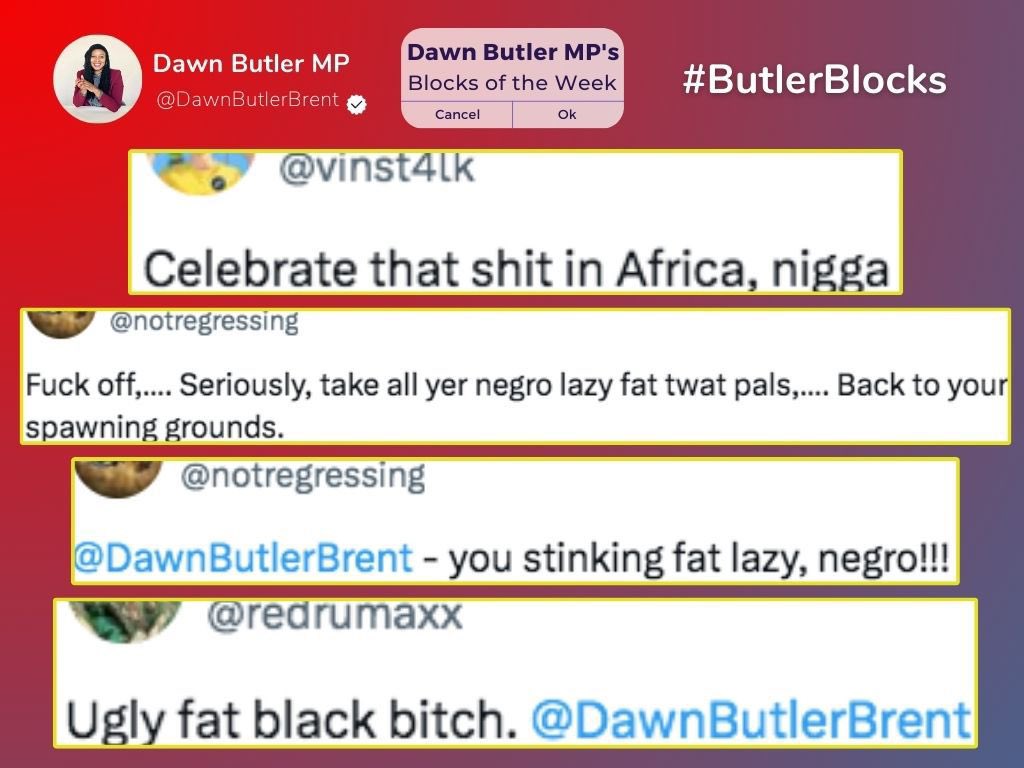Last year Dorset Eye exposed some of the vile racism aimed at asylum seekers in Weymouth & Portland:
It is just the tip of the iceberg though, as cowardly low intelligent keyboard warriors spew out their hate. Failed at school and in life, they focus upon people who are different to them. The intention is to attempt to create discord and anxiety in the lives of others to compensate for their own pitiful existences. They know that for the many decent people across society, their subsequent demise will be a cause for celebration. Their corrosion removed.
The secret is to block them or deny them the opportunity. Their malignancy will be their epitaph. What a waste!
Dawn Butler, the Labour MP, has to experience this behaviour on a daily basis. Sick tormented people expend energy disgorging via social media because it is all they have. A malignancy that has consumed them and has become them.
The following is just a very small fraction of this sickness.



For the rest of us we have to be strong. We have to endeavour to ensure that this affliction does not contaminate our lives. The following are ten tips for those who may need assistance:
- Educate Yourself and Others
Understanding the roots of prejudice, whether cultural, historical, or systemic, enables you to have informed conversations. Share your knowledge to counteract stereotypes and misinformation. - Challenge Stereotypes
When you hear someone making sweeping generalisations, question them. Politely ask for clarification or provide examples that break down such stereotypes, showing that they don’t apply universally. - Use Empathy and Listen Actively
Engage in discussions that allow individuals to share their experiences. Sometimes, personal stories can help shift perspectives and foster understanding. - Speak Up Against Discriminatory Language
If someone uses offensive language or slurs, calmly express your discomfort and explain why such language is harmful. Doing so can discourage casual bigotry and make others reconsider their words. - Encourage Critical Thinking
Encourage others to question prejudiced ideas and reflect on their own beliefs. Discussing the ‘why’ behind their assumptions can often lead people to question ingrained biases. - Promote Inclusive Language
Using language that respects diversity in ethnicity, gender, sexuality, and religion sets a positive example. Inclusive language helps challenge ingrained biases and shows respect for everyone. - Support Anti-Bigotry Initiatives
Join or support local organisations that work against bigotry. Whether through donations, volunteering, or amplifying their messages, supporting these groups promotes a culture of inclusion. - Foster Diverse Friendships and Communities
Creating and encouraging diverse networks exposes people to different perspectives and fosters mutual respect, which can break down biases rooted in unfamiliarity. - Use Humour Carefully to Diffuse Tension
When appropriate, humour can defuse tension and provide a non-confrontational way to address prejudice. Clever humour can sometimes prompt self-reflection without causing defensiveness. - Model Tolerance and Kindness
Leading by example and treating everyone with respect, regardless of their background, sends a powerful message. Others are more likely to follow suit when they observe you challenging bigotry through kindness.
Each of these methods offers a way to actively engage with and diminish prejudice, creating more inclusive and respectful environments.
Even those who have the sickness can get better. They must however, follow the above steps. It just takes some strength of character.
To dramatically reduce the sickness going forward we will require something more comprehensive.
A Longer Term Strategy
1. Education and Awareness: Transforming Beliefs
One of the most effective ways to combat racism is through education. Research shows that prejudices often stem from ignorance or fear of the “other.” Schools, families, and workplaces should incorporate comprehensive, inclusive curricula that focus on diverse cultures, histories, and perspectives. Educational programs on systemic racism, colonial history, and the contributions of marginalized groups can foster empathy and understanding.
- Inclusive Curricula: Schools and universities should teach about racial history, the ongoing impacts of colonialism, slavery, and segregation, and the contributions of Black, Indigenous, and other marginalised communities. When people understand how racist ideologies have been constructed over time, they’re better equipped to recognise and challenge these ideas in the present.
- Anti-Bias Training: Anti-racist education and unconscious bias training, especially in workplaces, are increasingly common. These programs help individuals recognise their biases and understand how they affect their behavior and decision-making.
2. Legislation and Policy Changes: Reforming Systems
Racism is entrenched in social structures and legal systems, so tackling it requires systemic reform. Legislative changes can help break down barriers to equality in criminal justice, housing, employment, healthcare, and education. Examples include:
- Equal Access to Resources: Laws that mandate equitable distribution of resources (e.g., healthcare, education, economic opportunities) are fundamental in reducing systemic inequities. Policies like affirmative action in education and employment, for instance, aim to level the playing field by addressing historical disadvantages.
- Criminal Justice Reform: Addressing disparities in policing, sentencing, and incarceration rates is essential. Programs such as community policing, implicit bias training for officers, and reforms to sentencing laws are aimed at reducing racial profiling and unfair treatment within the criminal justice system.
- Voting Rights Protections: Expanding access to voting, especially for historically marginalised communities, ensures that everyone has a voice in the political process, which leads to more representative policies.
3. Economic Equity: Closing the Wealth Gap
The wealth gap between racial groups in many countries is a major factor in perpetuating racism. Addressing economic inequality involves implementing policies and practices that ensure all people have equal opportunities for financial security. Key measures include:
- Equitable Employment Opportunities: Encouraging diversity in hiring, supporting minority-owned businesses, and creating pathways for underserved communities to access high-paying jobs help to create economic equity.
- Fair Housing: Addressing redlining, discrimination in lending, and unequal property tax distribution can help close the wealth gap by enabling people from minority groups, to buy homes, build wealth, and access better-funded schools.
- Reparations and Restitution: Some advocate for reparations to communities that have been historically harmed by racist policies and practices. Reparations can come in various forms, such as direct payments, community investment, or scholarships, to support the economic advancement of disadvantaged groups.
4. Community Engagement and Dialogue: Building Bridges
Open, honest dialogue about race can foster mutual understanding and respect among different groups. Community-led initiatives play a significant role in breaking down racial barriers.
- Cross-Cultural Dialogue: Programs that bring together people from diverse backgrounds encourage understanding, empathy, and unity. Conversations that address shared values and human experiences can help bridge racial divides and debunk stereotypes.
- Grassroots Organising: Many movements for racial justice start at the community level. Local activism, from advocating for school reform to community policing initiatives, allows communities to address specific forms of racial discrimination they face and build solidarity.
- Allyship and Advocacy: True allyship goes beyond passive support; it requires actively advocating for racial justice, showing up for marginalized communities, and calling out racism in personal and professional settings.
5. Media Representation and Responsibility: Shaping Public Perception
The media has a significant influence on societal attitudes, and changing the narratives surrounding race is a powerful tool for combating racism. Improving representation and challenging stereotypes in the media can have a positive impact on public perceptions.
- Diverse Representation: Ensuring that minority ethnic groups are represented accurately and respectfully in movies, TV shows, news, and advertisements helps to normalize diversity and challenge negative stereotypes.
- Combating Misinformation: Racist narratives are often perpetuated through false information and harmful stereotypes. Fact-checking and countering these narratives help to prevent the spread of divisive rhetoric.
6. Mental Health and Trauma Healing: Addressing the Psychological Impact of Racism
Racism causes deep psychological harm to those who experience it, and healing from this trauma is essential. Providing mental health resources that address the specific impacts of racial trauma can empower individuals to overcome personal and intergenerational effects of racism.
- Trauma-Informed Care: Therapy that addresses racial trauma helps people of color process experiences of discrimination and the emotional toll of living in a racist society.
- Community Support Programs: Creating safe spaces within communities to discuss racial experiences, share stories, and find support can help people process trauma collectively.
7. Personal Accountability and Growth: Encouraging Individual Responsibility
While systemic change is crucial, personal responsibility is also essential. Each person can take steps to confront and change racist beliefs and behaviors within themselves. Self-reflection, continuous education, and willingness to listen and learn from others are vital components of individual growth.
- Self-Education: Rather than relying solely on people of color to explain racism, individuals can take the initiative to read, watch, and listen to resources that offer perspectives on race and racism.
- Challenging Racist Behaviours: When people encounter racism in their social circles, workplaces, or communities, speaking up and challenging it sets a precedent and creates an atmosphere where racism is not tolerated.
- Practicing Empathy: Building meaningful relationships across racial lines can shift personal beliefs and encourage empathy and understanding.
Moving Towards an Anti-Racist Society
While curing racism is a daunting goal, significant progress is possible through a holistic approach that combines education, legislative reform, economic justice, and personal accountability. Healing from racism also requires empathy, courage, and commitment to continuous improvement, both individually and collectively. Each step toward a more inclusive, just society is a testament to the power of human resilience and unity.
Don’t choose to stay sick. Choose to get well.







